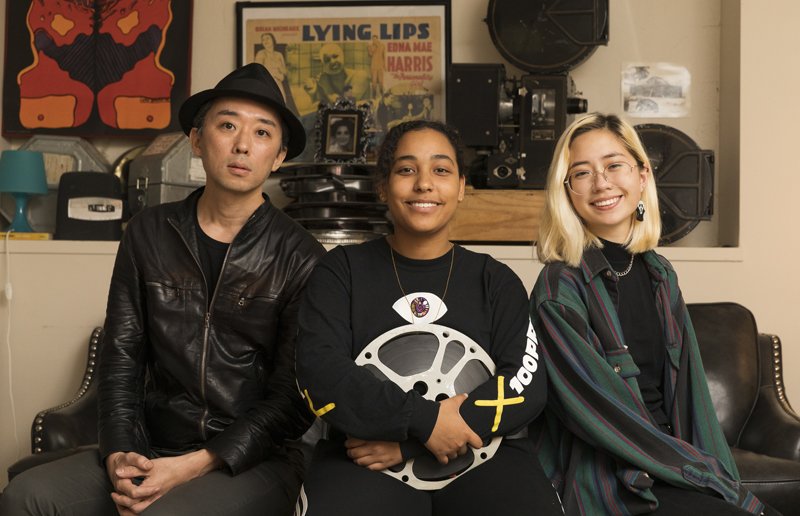Cinema Department students to organize annual film festival
SEFF to take place Nov. 22-23 in downtown Binghamton and on campus

The Student Experimental Film Festival in Binghamton (SEFF Binghamton) will commemorate its 10th year of celebrating student experimental filmmaking.
SEFF Binghamton is a two-day film festival organized by students enrolled in the Cinema Department’s Curating Film and Video course. This year, the first night of the festival will be held at 7 p.m. Friday, Nov. 22, at The Annex Theatre in the Bundy Museum of History and Art in downtown Binghamton. The festival will also be held in Lecture Hall 6 on the University’s campus at 7 p.m. Nov. 23. Both nights of SEFF Binghamton are free and open to the public.
This year, Curating Film and Video is taught by Daïchi Saïto, a visiting assistant professor. Saïto previously taught the course in 2016, and based on his previous experience, Saïto said the success of both the festival and the course is dependent on the students’ initiative.
“I think this year the class is pretty good,” Saïto said. “They’re willing to raise funds so that we can run the festival in a more professional manner. For example, we could do the entire festival in Lecture Hall 6, but they decided to spend one day outside of the University. It takes more participation, time and energy to do an event outside of campus, but they’re excited about it. These things matter. I have big hopes for this year’s festival.”
SEFF Binghamton accepts film submissions for the festival that meet the following criteria: the film was made by students in the United States; it must have been made within the last academic year; and it must fit under the scope of experimental cinema. After watching the film submissions, students organize the films into programs. Each program is centered around a specific theme. There will be four programs presented during this year’s festival, two programs per night. Which film submissions are shown during the festival depends on whether or not the film fits into one of the four programs.
Organizing different film submissions into programs is a difficult task because it is important that the combination of films work cohesively, Saïto said.
“The audience’s perception and reception of each film in a compilation program are often influenced by the way it is placed in relation to the other films,” he said. “In a poorly curated short-film program it can work against individual films.
“Curating film programs requires intelligence, a critical eye and imagination. It is not simply about grouping different films under a unified theme. It is about generating meaningful conversations among the selected works and offering fresh insights about them,” Saïto added. “Curating is a creative act. It’s an exercise in juxtaposition not so dissimilar to filmmaking in a way.”
Jolie Ramirez, a sophomore majoring in cinema, is a senior programmer and a projectionist for the film festival. She has found experimental cinema to be more meaningful and credits the Cinema Department for exposing her, what is for her, a new realm of filmmaking.
“I like to think of [experimental cinema] as what you see and how you see it because everyone can find something in there that they can relate to and that means something to them,” Ramirez said. “It’s special. I feel like Hollywood gives you more of a straightforward idea.”
Brittaney Skavla, a senior cinema and psychology double major, is a graphic designer, webmaster and guest coordinator for the festival. She said she is enjoying curating a festival specifically tailored for experimental cinema.
“That’s what our department is,” Skavla said. “It’s based on experimental film, so the whole festival reflects the department’s origins.”
Best known for its experimental filmmaking, the Cinema Department was founded in 1969 at a time when cinema was not yet widely recognized as an academic discipline in U.S. colleges.
Film curation is a vital part of the experimental cinema community, and the Cinema Department continues to be active in it, Saïto said. Examples include the Harpur Cinema program, the Visiting Film & Video Artists & Speakers Series, the student-run BU Film Salon and Transient Visions (an experimental film festival that takes place in Johnson City).
“Our students have plenty of opportunities outside of class to get exposed to interesting works,” Saïto said. “In addition, if you are in the Curating Film and Video course, you also get exposed to what film students from other schools are up to — SEFF Binghamton receives over 200 submissions from across the country. That can be an inspiring experience. I think what this department offers is unique and important.”
Skavla said she is excited to honor the department’s heritage in the festival.
“It’s an intimate experience in this department,” Skavla said. “I’ve gotten to know all of my professors very closely, and I can rely on them for honest feedback. It’s a very comfortable, inviting and inspiring department. I don’t think I would have the same experience being anywhere else.”

